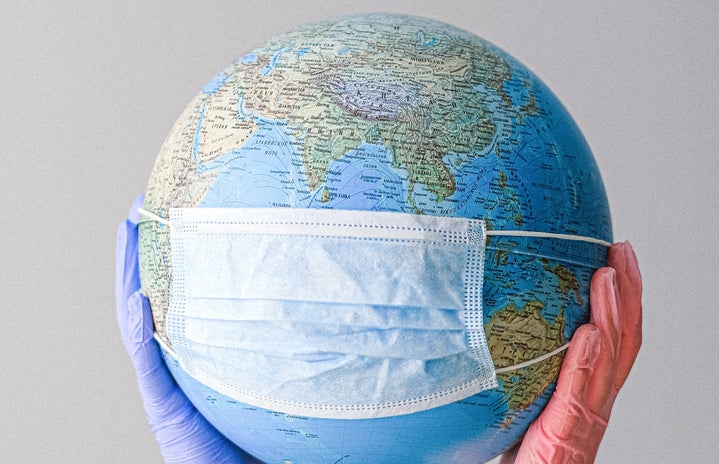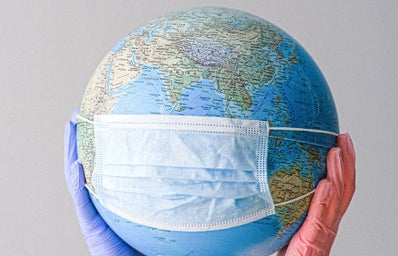This winter break, I decided to embark on a journey I never would have pegged myself for a year ago. When COVID-19 swept through the United States last March, I, like many people, was filled with uncertainty and fear for what the future would hold. Over time I adjusted to what the new “normal” was, but nevertheless, I was plagued with doubt and apprehension when it came to vaccine development. I recall in June when the first wave of participants in vaccine trials began to receive their doses. I admired their bravery yet felt like participating in a vaccine trial would be too risky or dangerous for me. Flash forward seven months later with a drastically worsening COVID-19 situation in the United States, and I no longer was so reluctant to sign up.
Here is some important background information:
-
I am in no way, shape, or form the poster child for health. I do have some underlying conditions that put me at increased risk for COVID-19, which is why I was so nervous about participating in the initial vaccine trials.
-
For this particular vaccine trial, you could have never tested positive for COVID-19 to be eligible. Luckily I have about a dozen unpleasant negative tests over the span of the last eight months to support that claim.
-
The trial administers the vaccine 2:1 fashion, so for every two people that receive the vaccine, one person gets the placebo. It is a double-blind experiment, so participants are first randomized and assigned one of the treatments. From that point on, neither the physician administering the dose nor the volunteer knows whether or not they’re getting the placebo or actual vaccine.
-
My mom also signed up for this vaccine trial, which makes for a unique and unconventional mother-daughter bonding experience.
Below I answer some of the questions I have encountered when asked what being in a vaccine trial is like.
Did you experience any COVID symptoms after your first dose, between your first and second dose, or after your second dose? If so, which ones?
After my first dose, which could have been the placebo, I remember feeling a bit of stiffness in my elbow joint later that evening, while with the second dose, my arm was only slightly sore for the thirty minutes following the injection. The day after my second injection, I woke up with some slight congestion. This could very well have been easily attributed to the cold, wet wintry mix that my North Carolinian immune system was not well equipped for. Besides that, I experienced no other symptoms. However, my mother experienced a bit of muscle soreness along with some heavy fatigue, which was resolved in a few naps.
Why did you choose to participate in the trial?
Each time I am asked this question, it elicits a different response. One reason is that during COVID-19, it often feels like I’m not doing enough. As the months have dragged along and we approach a year of living in a pandemic, I notice how much I’ve become numb. The mounting death toll moves me to tears, and I questioned how I could help. With increased risks for complications, the vaccine trial seemed like a viable way to contribute to the effort. On top of that, many communities of color remain hesitant or outright against the vaccine. Even if participating in the vaccine trial only eases the anxieties of others in my family, it is just one piece of a broader community effort to build trust.
Are you worried about any potential long term side effects of a still-in-development vaccine?
If you had asked me six months ago, my answer would have been “yes.” However, after doing research online about this specific vaccine, I was reassured that I WOULD NOT be injected with the live virus NOR could it in any way alter my DNA. I think my main concern right now is the long term side effects that may arise out of COVID-19 itself rather than the vaccine.
Did you test positive for COVID-19 after participating in the trial?
I have been tested at least twice since my first dose and have not tested positive for COVID-19.
What are your expected results from this trial?
I hope that by participating in this trial, it will lead to the approval of yet another vaccine so the spread of this virus can be decreased, and we will not continue to lose countless lives each day. The Novavax vaccine is already seeing encouraging results back from trials in other countries. Hopefully, since it is behind other vaccines, we can receive more information on how it fares against the rapidly emerging variants.
Do you attest that your consent to the trial was totally informed?
In short, I would say yes. The eligibility determination and informed consent processes were actually a bit lengthy. This consisted of several phone calls as well as a two-hour-long Zoom orientation before I ever even stepped foot in a facility. During this Zoom meeting, they went over every page of the consent forms (to ensure we didn’t overlook anything) and allowed us to ask any questions we may have had. They reviewed the whole process from what tests we would have done to diversity and inclusion, as well as the electronic diaries we would have to fill out each day. This two-hour-long session was then followed by a one-on-one phone call where they again walked us through signing the consent forms. Again in person, before I was injected with anything, a physician performed a physical examination and reviewed my health history before deeming me eligible.
At any point during the trial, were you concerned by the safety of the procedure or the integrity of the experimental design?
The particular testing facility I went to felt relatively safe. As soon as I walked into the facility I had to sanitize my hands and change into a fresh mask. From there, I spent most of my time in a private room where various health personnel came in to administer tests or the dose. The double-blind experiment seeks to eliminate bias from the researchers, so it is hard to find fault in the experimental design. Though it should be noted that if it ever becomes an issue, I can ask to be unblinded from the experiment and may leave the trial. Overall safety did not stand out as something that was being jeopardized; however, if you have a fear of needles just know that blood will be drawn.



